Good morning from Athens.
The swallows are wheeling above the Acropolis. The Greek flag has yet to be raised. Already the heat of the day is starting to build.
We arrived yesterday morning and were greeted at the airport by our Brilliant Guide Jenny Malikouti and careful driver Christos.
We were soon driving along the eastern coast of the Attica peninsula, stopping at the lovely little port of Lavrion for coffee and snacks.
Soon we reached the southern tip of the peninsula, where the Temple of Poseidon keeps watch.
The first mention of this place is in Homer’s Iliad. King Menelaus stopped here on his way back to Sparta from Troy to bury his pilot. There were two temples here, another to Athena. The first temples were destroyed by the Persian Xerxes in 480 BCE, but after the Battle of Salamis the Athenians placed an entire captured enemy trireme here as a trophy dedicated to Poseidon.
The Athenian statesman Pericles had the current temple built, completed in 440 BCE. Byron was one of many who carved their name into the marble, and it can still be seen.
We continued along the southern coast of the Attic Peninsula, stopping at an interesting lake formed, like the cenotes in Mexico, from a collapsed limestone cave.
Lake Vouliagmeni is a bit salty, formed from natural limestone springs but in communication with the sea a hundred meters away.
Soon we reached our destination of Piraeus, Athens’ main port, and enjoyed an amazing lunch while sailboats raced offshore.
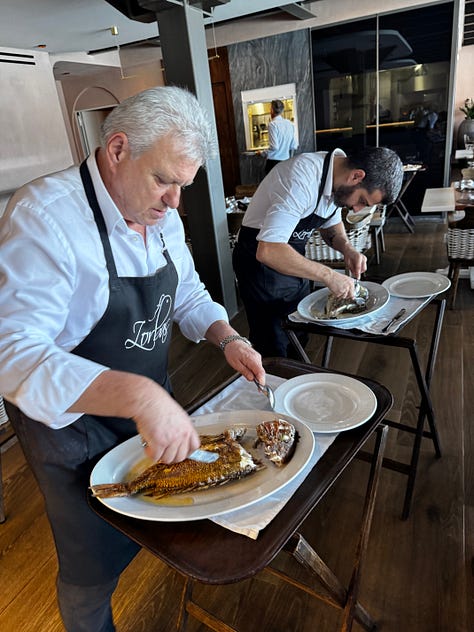
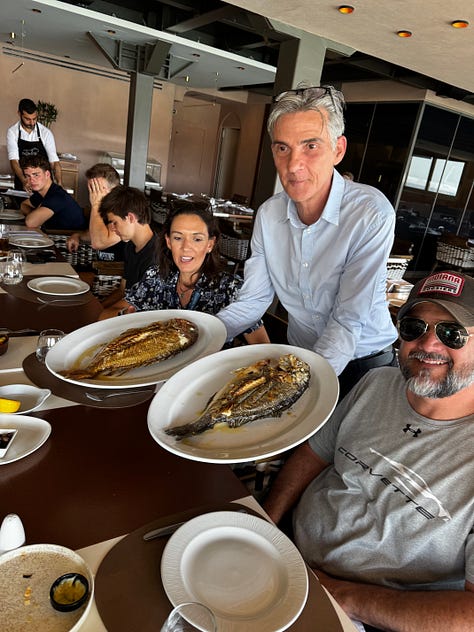
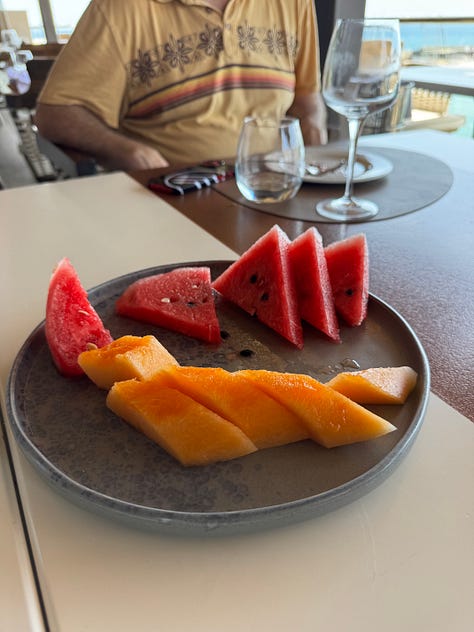
As the ocean breezes swept through we ordered for the whole table. One red snapper and a dorado. There was some disagreement which was the best. Delicious, topped off with melon for dessert, as the ocean breezes kept us cool. It’s sold by the kilo. The tab for the entire table of 14 was less than 500 Euros.
Looking at the globe, it should come as no surprise that a civilization of learning and philosophy should arise in Athens. Here was a warm sea, with many islands, bays and coves that provided both sustenance through fishing and farming, a means of transportation and communication with a wide range of people who shared the Mediterranean, and defensible sites for cities.
Eighteen thousand years ago, during the last ice age, the Aegean was 130 meters lower, with large well-watered coastal plains punctuated by the mountain tops that are now islands.
Though it was the cradle of democracy, Athens was not one of the early cradles of civilization. Scholars have identified six cradles of civilization: Mesopotamia, Ancient Egypt, Ancient India, and Ancient China in Afro-Euroasia, then Peru and Mexico in the Americas.
They all depended on farmers to create a surplus of protein which supported a centralized government. All had political and religious leaders who instigated public works and ruled urban centers.
These first civilizations used cult (religion) to wield control over their populations, and writing to preserve their histories and knowledge, thereby cementing the power of their elite and that of their cults.
Those people included the Egyptians, who for thousands of years before the rise of the Greek City States (Polis) had tamed the Nile and formed a rigid hierarchical state that relied on hereditary rulers with little upward mobility. (New subscribers can search this site for posts on our trip to Egypt. Up Up and Away in my Egyptian Balloon~!
In Ancient Greece, and even today, the water highway of the Aegean provided communication between and among the various cultures of the Mediterranean. Many of the Greek gods were related to those of these other cultures.
The early Greek gods were a reflection of the society in which they were formed, and tracked (copied?) those of the Egyptians, and perhaps those of Mesopotamia. Zeus and Amun-Re were the supreme gods, associated with the sky and with the “divine order.” Hades and Osiris were both gods of the underworld, holding out hope for eternal life. Athena and Neith were both goddesses of wisdom and war.
The “divine order” gave power to the rulers. The power of the gods was reduced in equal proportion to the growth of knowledge and philosophy. The Ancient Greek religions / cults were transactional in nature. Sacrifices to the gods could insure a good outcome to your venture, be it a trip, a wedding, or a battle. If the outcome was not as you had hoped, it wasn’t the fault of the gods, but rather your fault for not following the proper ritual.
The Greek city states eventually emerged from the Bronze Age Collapse, and the dark age that followed that collapse. The epics of Homer recall the glories of that time.
As the people of the early Greek City States emerged from the slumber of those dark times a new spirit of inquiry emerged.
The power of Curiosity was about to be revealed.
This early experiment in democracy could not survive the global forces arrayed against the Athenians, nor even the power of other rival city states like Sparta, formed on the communist system.
But the ideas and philosophies were, thankfully, recorded and rediscovered during the enlightenment over a thousand years later as the world awoke from the dark ages.
Oh Alexandria! If only your library had been preserved!
Now we’re settled into our Perianth Hotel, located conveniently in the Plaka just north of the Acropolis. The Brilliant Wife is already down at the breakfast room. We have a big day today.
A big shout out to our Brilliant Travel Agent, Sonya Yassi, Beyond the Seven Seas! Thanks Sonya everything is great and everyone is very happy! Our Guide Jenny is super!
So glad you’re traveling along~!





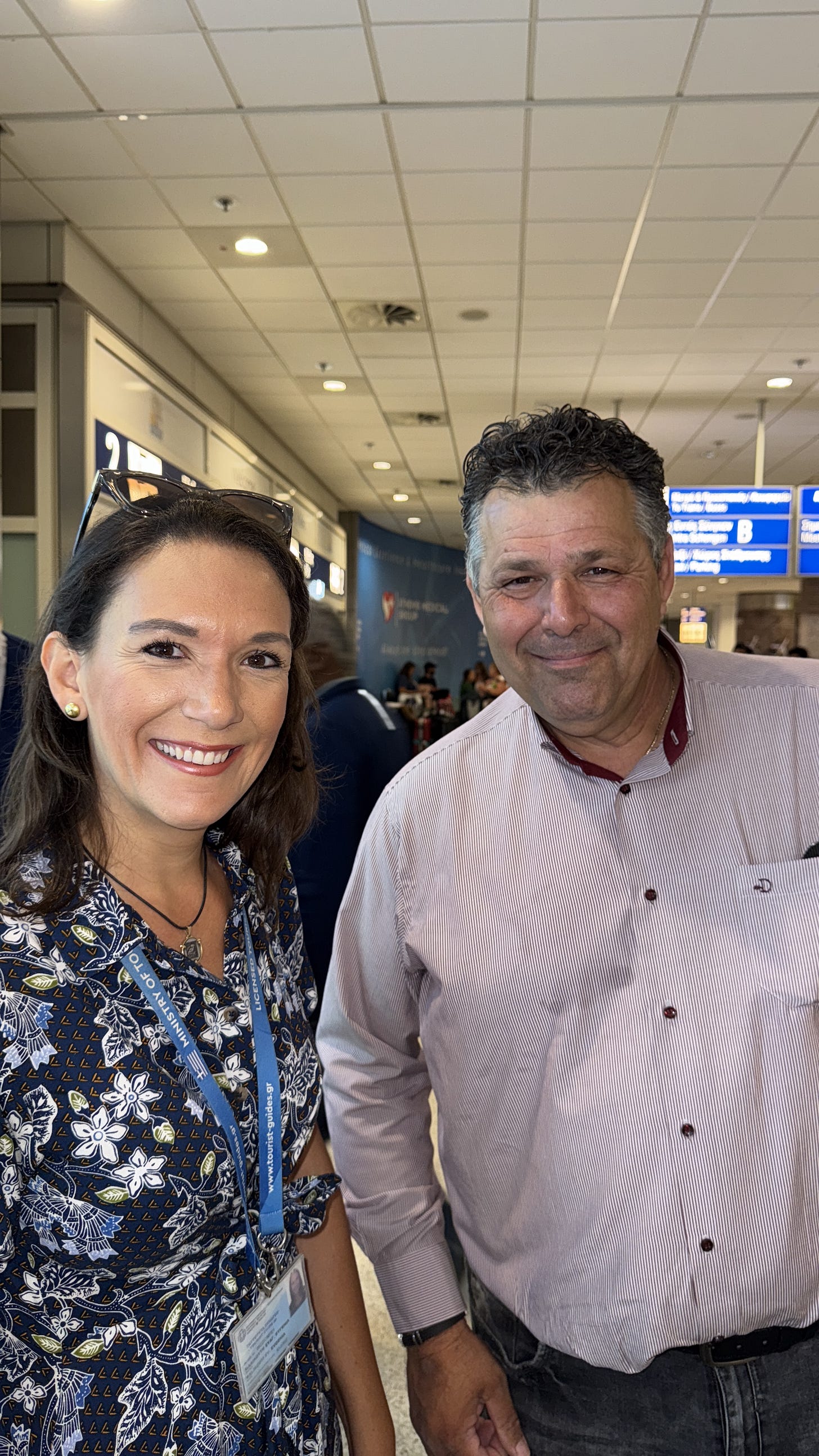



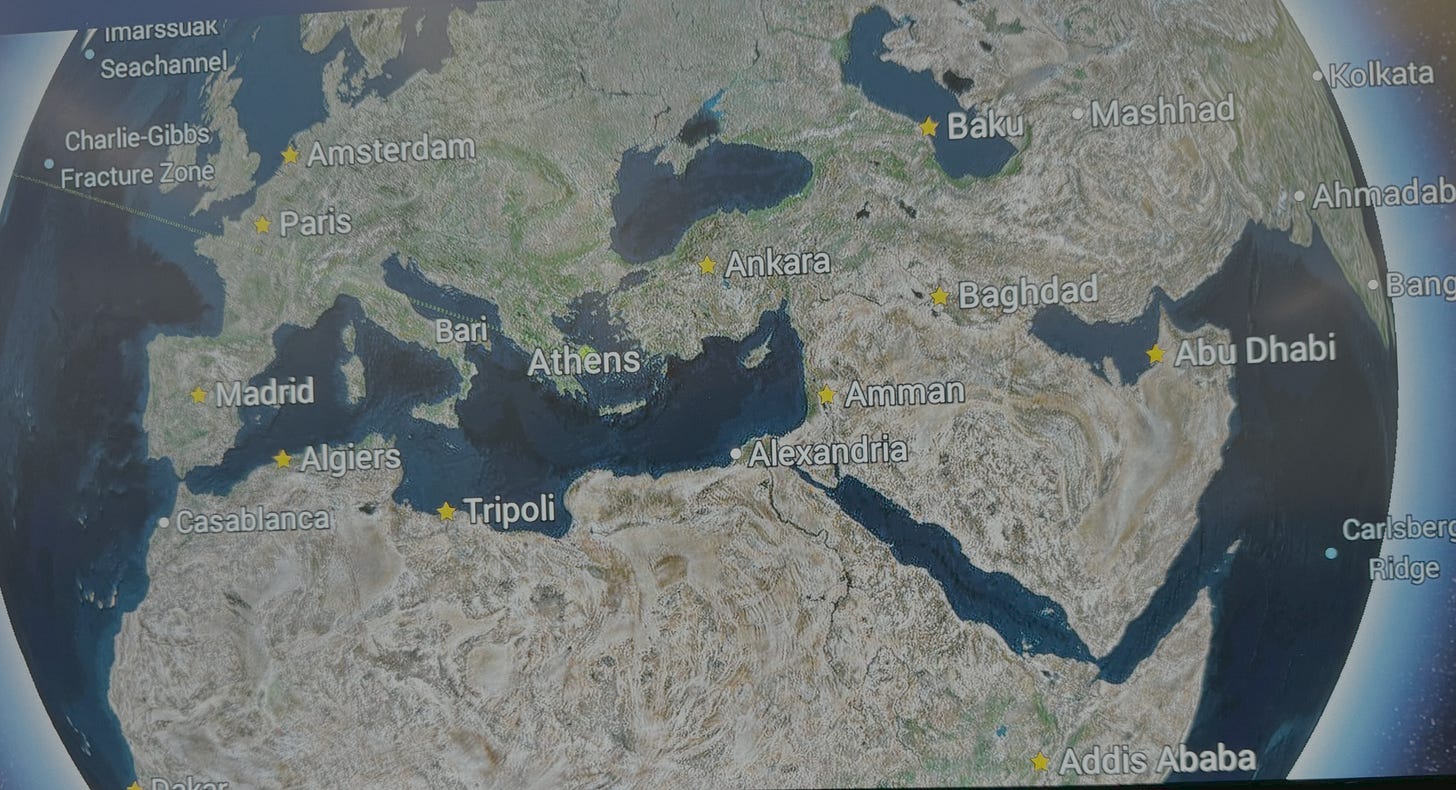

The adventure begins!! Fantastic photos and thanks for letting us travel along!!
What a beautiful family and so many smiles in the picture. All the best to each and every one of you!